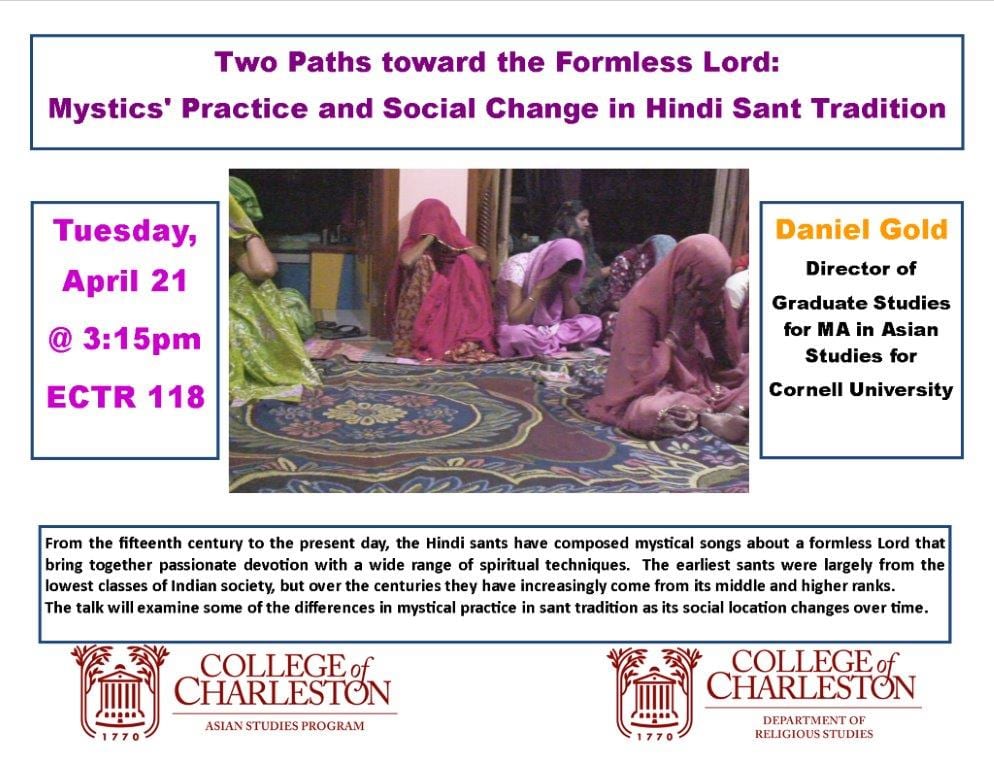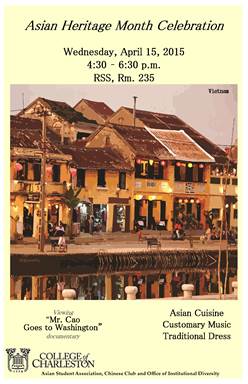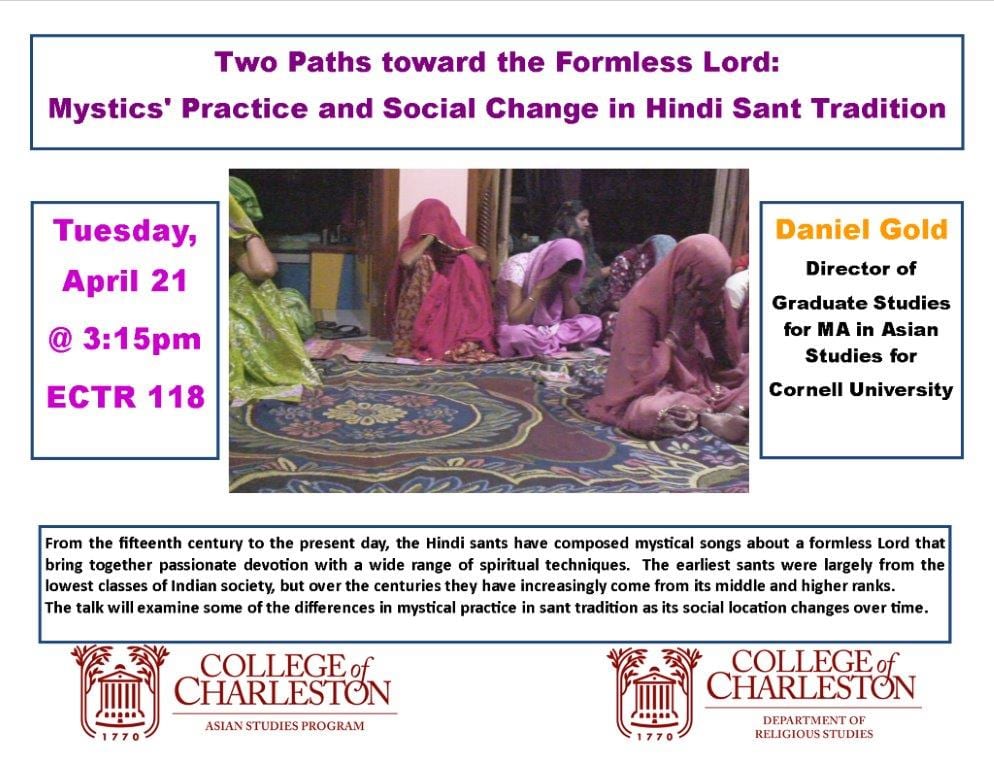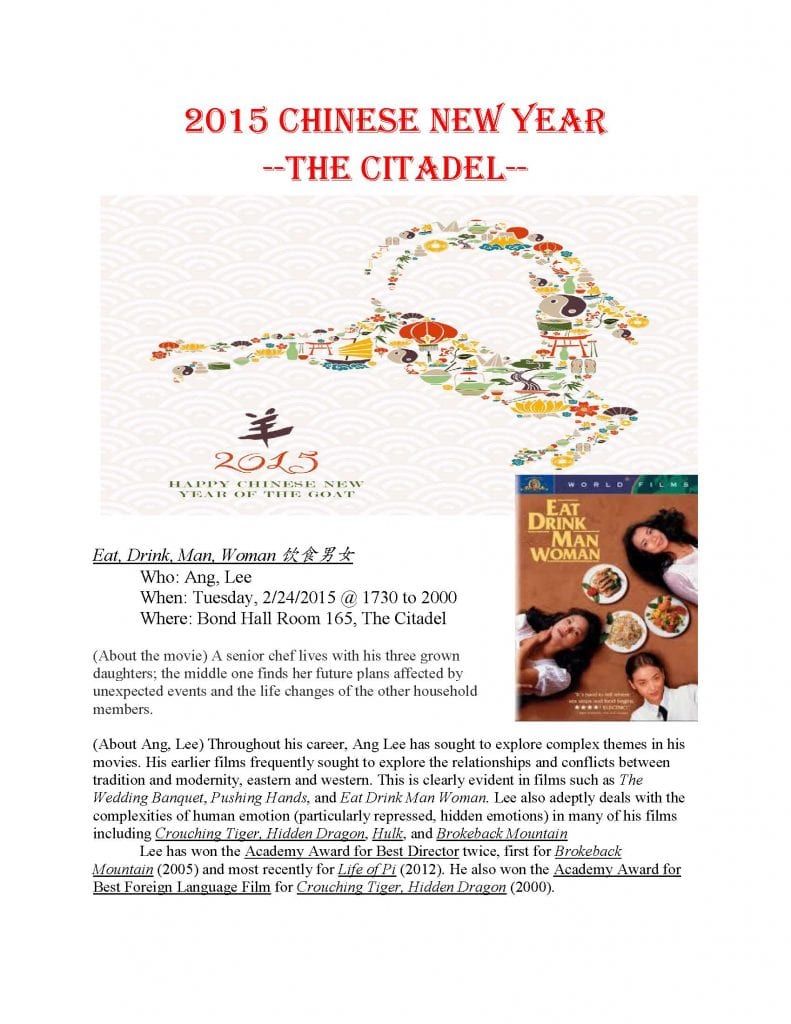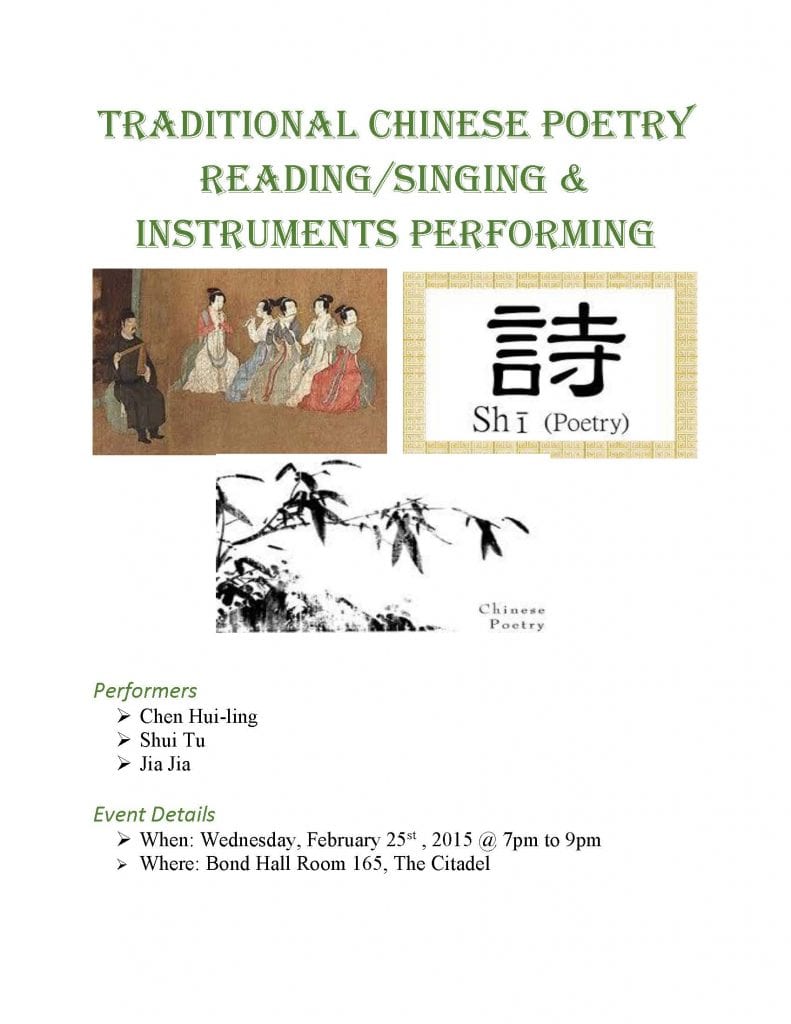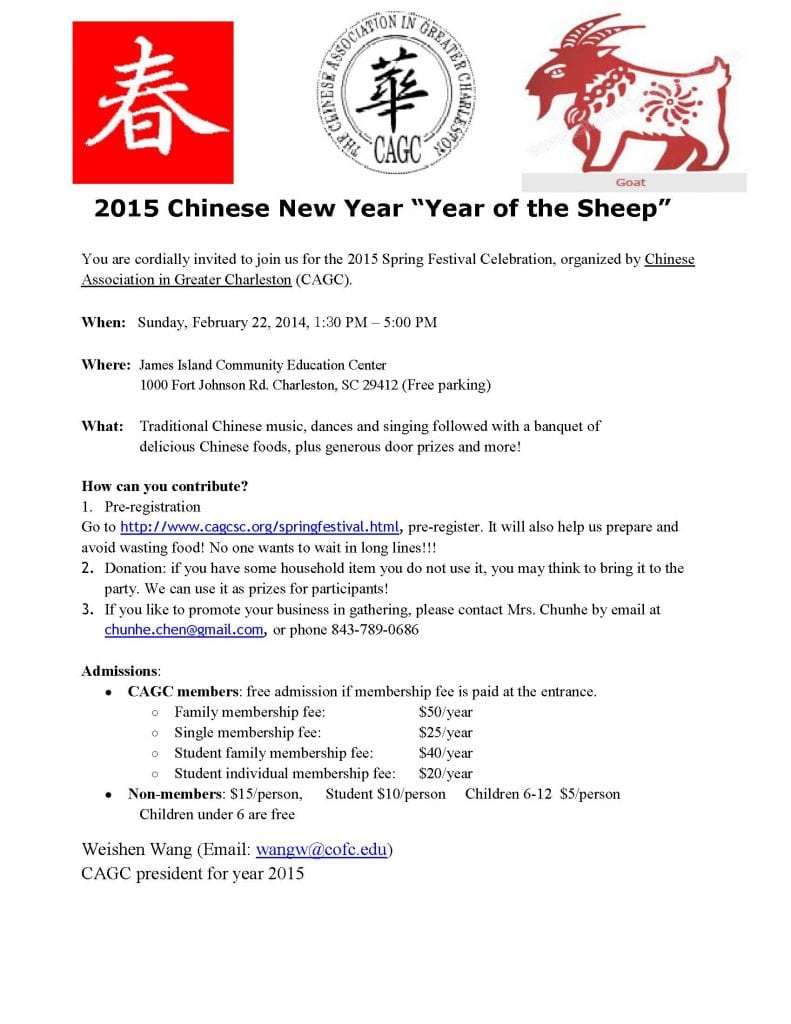Tag Archives: culture
Help the English Language Institute to Bring Students from Japan!
The College of Charleston English Language Institute (ELI) hosted a professor, Kayoko Takegoshi, from Japan’s Toyama University during the fall of 2014. She met our students and faculty, attended our ESL classes, toured the campus and city, and returned to her home university to arrange a “CofC ELI short term program” for her sophomore students. She anticipates that 4-5 students will be interested in attending the English Language Institute from August 24 – September 25, 2015. This is a summer break for Toyama University students, so it is the only opportunity for them to study abroad. As student housing is at a premium, especially at the beginning of the academic year, it’s not possible to lodge these students in the CofC dorm.
Therefore, the CofC ELI program has launched a homestay program and is in the early stages of recruiting individuals, couples and families who would be interested in hosting a Japanese student for 5 weeks. For families with young children, this can be a life altering experience as children of all ages benefit from interacting with people from other cultures, and through this process, learn tolerance and other essential qualities of becoming global citizens.
These students are university sophomores and are independent adults. Ideally, the homes would be within walking or biking distance from the CofC campus so they could come and go on their own. Students attend ELI classes M-F from 8am-3pm, depending on the day, so they would purchase a meal plan to cover breakfasts and lunches. Dinner would be prepared at home. Host families would be adequately compensated for hosting a student, and would be expected to include the student on any appropriate family excursions during the weekends. As English language acquisition is a primary goal of the students, involving them in English conversation in the family setting would be strongly encouraged.
If you are interested in learning more about the CofC homestay program, please contact Alice Hamilton at hamiltonam1@cofc.edu by April 20, 2015.
Asian Heritage Month (early) Celebration
Two Paths toward the Formless Lord: Mystics’ Practice and Social Change in Hindi Sant Tradition
Summer I ONLINE Course Opportunity! “The Role of the Quran in Contemporary Islam”
Registration for Summer classes begins on March 10!
ARST 273 (CRN 30754) will be offered ONLINE by Dr. Ghazi Abuhakema during Summer I.
Course Description: In this course, ARST 273, The Role of the Qur’a and its Place in Contemporary Islam, students are introduced to some of the key ideas and themes of the Quran and its role as the ultimate source of authority for Muslims. The course also examines current, and, in some cases, controversial, issues, and explores how particular Qur’anic passages have been cited and interpreted with respect to these issues.
Chinese New Year Events Continue this Week!
Chinese New Year 2015: Year of the Sheep
This story has been republished from the College Today article.
Originally publised: 17 February 2015 | 1:26 pm
by: Ron Menchaca
Contact: Weishen Wang, professor and chair, Department of Finance, 843.953.0887
Chinese New Year begins Feb. 19, 2015. Originally based on the Chinese lunar-solar calendar, the holiday is celebrated in many Asian countries over several days.
The holiday, also known as Spring Festival, is traditionally celebrated by families coming together to renew ties.
Each Chinese New Year is assigned to one of 12 zodiacal animals, with 2015 being the Year of the Sheep.
“It is a great family time, similar to Christmas here in the USA,” says Weishen Wang, professor and chair of the Department of Finance in the School of Business. “We will have great food, in particular, dumplings, and performance. Usually people put on new and beautiful clothes. Grown-ups give kids lucky money.”
Millions of people will travel from major Chinese cities to celebrate the holiday with their families.
LINK: View a heat map showing the massive amount of travel that occurs during Chinese New Year.
As president for the Chinese Association in Greater Charleston, Wang is helping to organize the association’s Spring Festival. The event takes place Sunday, Feb. 22, 2015, from 1:30 p.m. to 5 p.m. at the James Island Community Education Center, 1000 Fort Johnson Rd., Charleston.
The event will feature traditional Chinese music, dances and singing followed with a banquet of delicious Chinese foods, door prizes and more. For more information and to pre-register for the event, visit http://www.cagcsc.org/springfestival.html
Association members receive free admission. Admission for non-members is $15, students – $10, children ages 6-12 – $5, children 5 and under – free.
EXPLORE: Study the Chinese language at the College.
2015 Chinese New Year “Year of the Sheep”. Spring Festival Celebration
Celebrating the Lunar New Year this Friday (Feb. 13)
This Friday, Feb. 13 the Asian Student Association in collaboration with the Cougar Activities Board will host a Lunar New Year celebration for the Year of the Goat. The event will take place in the Stern Student Center Ballroom from 7-9pm. There will be food, fun and entertainment, including a professional magician from Seattle, Washington: Nash Fung.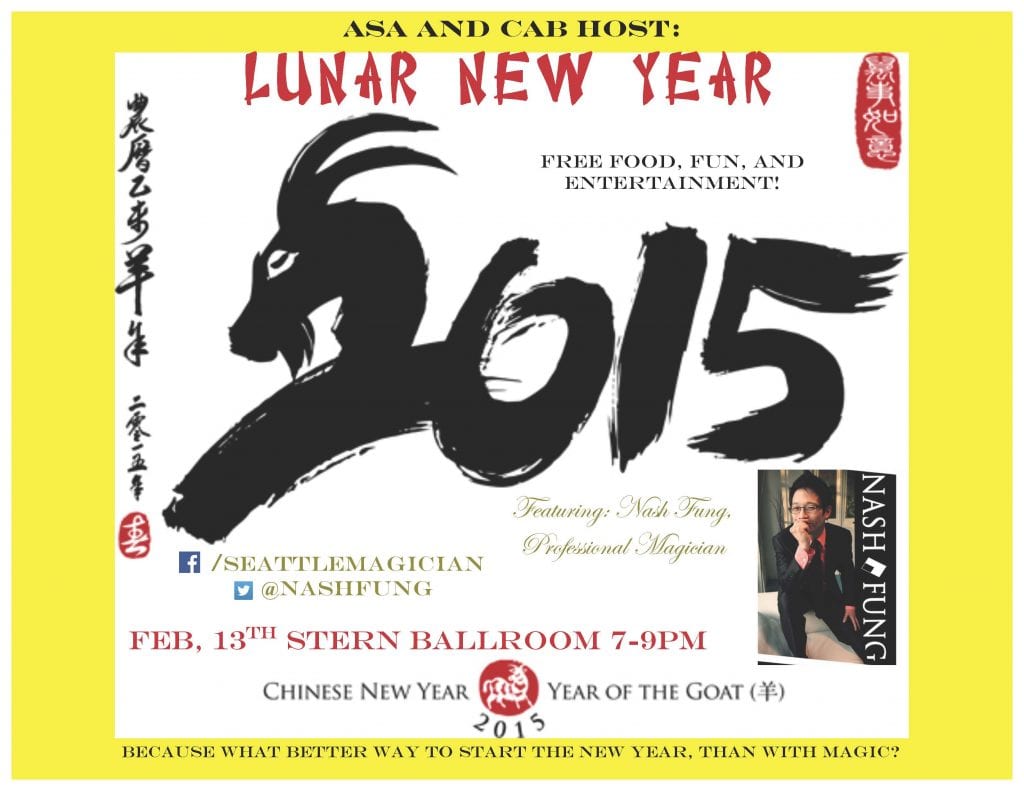
10 EXTRAORDINARILY USEFUL JAPANESE PHRASES FOR TRAVELERS (From Matador Network)
http://matadornetwork.com/abroad/10-extraordinarily-useful-japanese-phrases-for-travelers/
SOME OF THESE JAPANESE PHRASES are practical. Some of them are funny. All 10 will greatly enhance your trip to Japan.
Note that all of the phrases are pretty informal, especially the one about crapping your pants. Also, I spell the phrases phonetically in the header, but spell them with the most common romanization of the Japanese characters when explaining a point.
Confused already? Don’t worry about it.
1. “Yo-ro-sh-ku o-neh-gai-shi-mus.”
This phrase is absolute magic. Say “yoroshiku” to any Japanese person in any situation and they will help you with anything and everything you need. It’s impossible to translate literally, but means something to the effect of, “Please do your best and treat me well.”
If you memorize nothing else before going to Japan, remember “yoroshiku” and you’re totally set. “Onegaishimasu” is a common word that means something similar to “please.”
2. “Yosh. Gahn-bah-di-mus.”
This phrase means something like, “OK, I’m going for it,” or “I’ll do my best.” A Japanese would say “Ganbarimasu” before taking a test or leaving the house for a job interview.
Japanese people will crack up if you say it before walking outside, eating noodles, or using a vending machine. Try saying it before using phrase #8.
3. “Ara! Onara suru tsu-mori datta keh-do, un-chi ga de-chatta.”
The literal translation of this useful phrase is, “Oops! I meant to fart but poop came out.”
Saying this never gets old, especially in public places, especially on a first date, and most especially if it’s clearly one of only 10 Japanese phrases that you’ve memorized.
When in Southeast Asia, I especially enjoy muttering in Japanese about crapping my pants while walking past Japanese tourists. The reactions are priceless.
4. “Mo da-meh. Yoh-para-chatta. Go-men.”
At some point during your stay, Japanese people will probably try to make you drink past your limit. That’s when this phrase comes in handy. It means something like, “No more, I’m already drunk, sorry.”
5. “Ko-ko wa do-ko? Wa-ta-shi wa da-reh? Na-ni mo wah-kah-nai.”
Where is this? Who am I? I don’t understand anything. This is what you say after failing to use phrase #4 in time.
6. “Ee-show ni kah-rah-o-keh ni ee-koh ka?”
Shall we go to karaoke together? This is a good line to use if trying to pick someone up from the bar. Think of karaoke as a transition point between the bar and the love hotel.
Note: Please don’t pronounce “karaoke” with lots of EEE sounds. It should sound like “kah-rah-o-keh,” not “carry-oh-key.”
7. “Hon-toe ni oh-ee-shee des yo!”
Use this one when eating. It means something like, “For real, it’s delicious!”
“Hontou ni” means “for real” or “really” or “I’m not kidding.” Japanese people are always telling sweet little white lies, so dropping a “hontou ni” from time to time is very much appreciated.
8. “Ah-nah-tah wa ha-ruh no ee-chee ban no sah-ku-rah yo-ree u-tsu-ku-shee.”
This classic Japanese pickup line means, “You’re more beautiful than the first cherry blossom of spring.”
9. “Ni-hon dai-skee.”
Japan is the best. I love Japan. When in doubt, just smile, nod, and repeat.
10. “Koh-nah ni kee-ray na to-ko-ro wa hah-jee-meh-teh mee-tah!”
Japanese people love it when you gush about their country. This phrase means, “I’ve never seen a place so beautiful before.” Bust it out at famous attractions and you’ll meet with instant approval. ![]()
This post was originally published on May 25, 2009.

